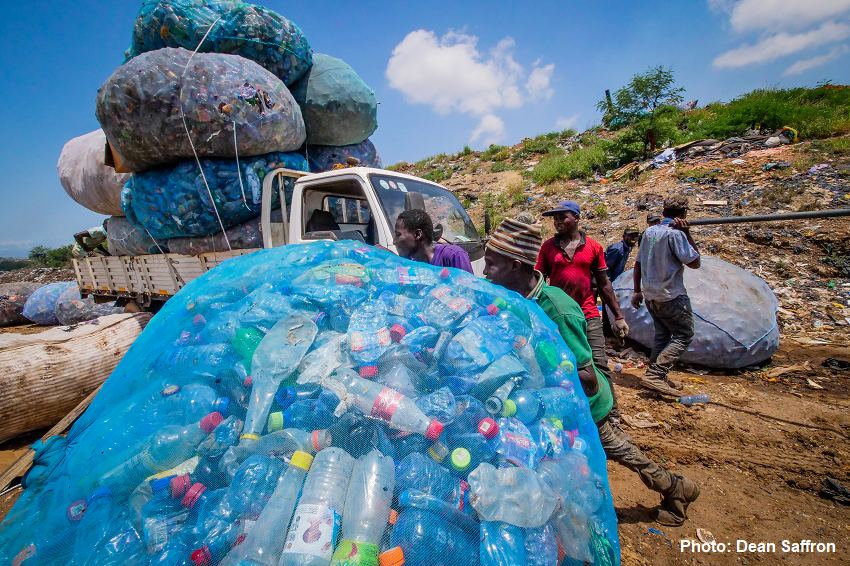 A group of informal workers collecting and transporting used plastic bottles on an open field. (Photo: Dean Saffron)
A group of informal workers collecting and transporting used plastic bottles on an open field. (Photo: Dean Saffron)
In cities around the world, an estimated 15 million people scrape together a living through informal waste picking. Many of them are women, children, elderly, unemployed, or migrants, who work under unhealthy conditions with no social protection and often face social exclusion.
These conditions are not uncommon for the majority of urban poor who work in the informal sector. In Africa, informal workers account for over 75% of employment in cities. Many work from their homes in informal settlements – as small-scale vendors, traders, garment workers, or waste sorters. These informal workers typically live and work in overcrowded conditions and in low-quality housing. They have limited access to basic services and often pay high prices for the services they do have, while facing high risks from flooding, landslides, and environmental hazards. For those working outside their homes, they must often travel long distances to access jobs and markets.
Globally, an estimated one billion people live in informal settlements in cities, and that number is expected to grow to more than three billion by 2050. As we observe the Global Waste Pickers’ Day this week, we can’t help but ask: What can be done to help the urban poor benefit from the opportunities that cities can bring?
This brings me back to a recent technical deep dive I joined in Tokyo, where urban development experts shared some of the emerging ways to tackle urban poverty. Among them were innovative solutions such as using disruptive technologies to map low-income communities, facilitate payment for services, and build low-cost houses with 3D printers.
For people living in informal settlements, their home is their workplace.
— World Bank Cities (@WBG_Cities) January 16, 2020
What can be done to improve livelihoods for the urban poor?
Watch a video with @judylbaker16 & Harvard @Kennedy_School Professor Marty Chen to learn more➡️▶️? #UrbanUpgrading #EndPoverty #Cities4All pic.twitter.com/HPw2Was4Ai
I was encouraged to learn that many of these new approaches have taken hold and created concrete impact on the ground. In India, communities have invested in sanitation facilities, a model scaled up across multiple parts of the country. In Brazil, the formalization of waste pickers has helped ensure viable livelihoods for low-income urban populations – just as several other countries create enabling public space for street vendors to achieve the same goal. In countries such as Brazil, Indonesia, and Kenya, slum upgrading projects have gone to scale with national-level programs that provide critical infrastructure, livelihoods, and opportunity for many…
At the policy and program level, these actions are necessary to reach the urban poor and ensure that they can benefit from the opportunities that cities offer. Such approaches were covered in detail in our 2017 study, East Asia and Pacific Cities: Expanding Opportunities for the Urban Poor. The study presents policy and program guidance for addressing urban poverty from an economic, spatial, and social perspective. A few key policy areas specific to enhancing livelihoods are:
- Connecting the urban poor with job markets: Investments in better transportation, infrastructure, and services to enable mobility in poor communities, as well as in education and skills upstream.
- Encouraging pro-poor economic development: Policies to protect and promote the rights of informal workers, such as legalizing space for informal work, incorporating waste pickers into the formal solid waste management system, and improving access to microfinance for the urban poor can have transformation impacts on informal workers.
- Provide equitable access to infrastructure and basic services: Upgrading informal settlements through investments in clean water, sanitation, solid waste collection and transport can have tremendous impacts on health, productivity, and welfare.
Other policy approaches focus on the spatial and social aspects of urban poverty. These approaches, which can be adapted to meet country or city-specific needs, are mutually reinforcing and intended to address the many dimensions of poverty facing vulnerable groups, such as informal waste pickers.
Do you have any thoughts or solutions to share on tackling urban poverty? Let me know in the comment section below.
READ MORE
- Blog: Beyond bright lights and skyscrapers, how can East Asia and Pacific cities expand opportunities for all?
- Subscribe to our Sustainable Cities newsletter
- Follow @WBG_Cities on Twitter




Join the Conversation